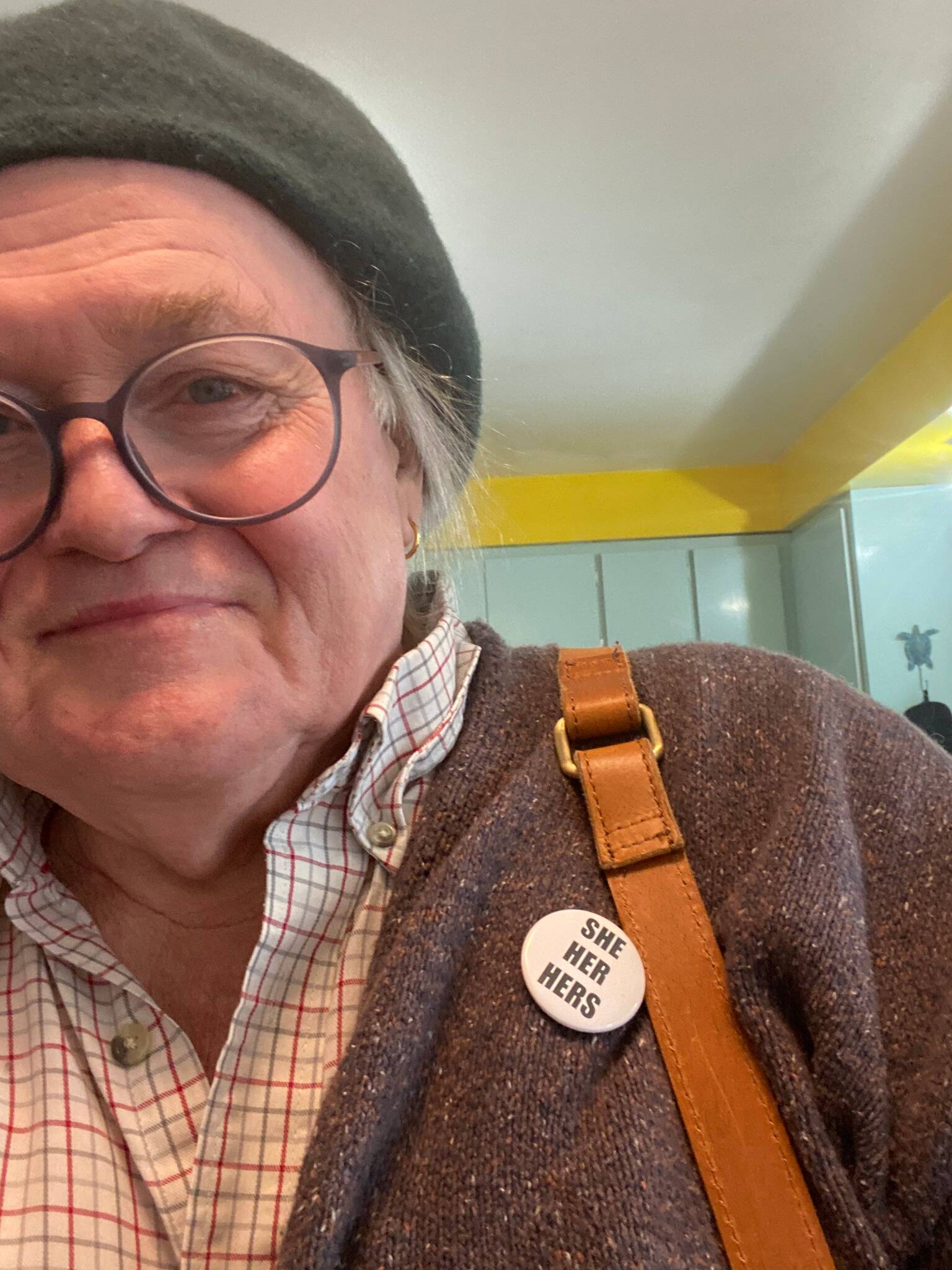British comedian, actor, and activist Eddie Izzard has been open (and entertainingly so) about cross-dressing for a long time (although it’s not “cross-dressing” for Izzard, who says “I don’t call it drag. I don’t even call it cross-dressing. It’s just wearing a dress… Women wear what they want and so do I.” I like that attitude.)
Ambivalent about pronouns in the past, in early 2020 Izzard announced that she would be “based in girl mode from now on” (not a man who wears dresses, but a person who wears what she wants) and would prefer being referred to by the feminine pronouns “she” and “her.”
But she’s not at all dogmatic about it. She says that asking others to use her chosen pronouns is “a request, never a demand”: “If they call me ‘she’ and ‘her,’ that’s great — or ‘he’ and ‘him,’ I don’t mind. I prefer to be called Eddie. That covers everything.”
I like that attitude too. My own approach to pronouns is roughly the same: I prefer “she” and “her,” but if you’re talking about me in the third-person I’m probably not there to get offended anyway. And even if I am there, I really don’t care. If you can’t call me by my chosen name and pronouns, that’s your hangup, not mine.
But what exactly is that hangup? I have many trans friends who are deeply offended when they are misgendered by pronouns, so we need to ask that question.
Naturally, when someone decides to transition and change their name and pronouns, people in their life will sometimes forget. Just the other day, someone requested my help, and I blurted out eagerly: “I’m your man.”
As if.
But why would anyone deliberately refuse to call someone by their right name and their chosen pronouns?
On the face of it, it’s an insult. But it’s also derogatory on a deeper level. It’s as if to say that I can be a real person only on your terms. It implies that your view of me is more valid, more true, more accurate than my own. That’s why this is serious business, and why counselors regularly advise friends and family of transgender people to be conscientious about using preferred pronouns.
What I love most about Izzard’s approach is that it robs someone of that insult. You’re free to call me what you want. And in so doing, Izzard allows people a freedom that they may not be ready to accept in her. This says so much about the kind of person Eddie Izzard is.
A pronoun is, as the name suggests, a word that stands for a noun. The noun that the pronoun stands for is called the antecedent. The antecedent for my pronouns is me, the self that my “me” refers to. My pronouns tell the world something about who I am.
If you’re refusing to use my preferred pronouns, you’re denying me my selfhood as a free, contingent human being like yourself. And the whole notion of personal freedom is based on a person’s freedom to determine who she is for herself and of herself and by herself, as much as she can.
Nineteenth-century British poet Robert Browning wrote a short poem called “Eurydice to Orpheus” that is one of the gems of English poetry. The story of this mythic couple goes like this:
Eurydice dies, and her partner, the great musician Orpheus, travels to the underworld, the land of the dead, and offers the god of the underworld, Hades, a bargain: he’ll play Hades the most beautiful music ever, if he will let Orpheus take his beloved back to life. Hades agrees, but with one condition: as the couple climb the rocky cliffs out of the underworld, Eurydice has to stay behind Orpheus the whole way, and if at anytime he turns back to look at her, Hades will hit the delete button and Eurydice will disappear into electronic space never to be seen again.
(Two men haggling over a woman’s fate without bothering to consult her. So typical.)
You can guess the rest: Orpheus agrees to Hades’ terms, the couple begin their ascent, Eurydice slips and starts to fall, Orpheus turns back to hold on to her, and poof.
She’s gone.
In Browning’s poem (remember Browning?), Eurydice cries out to Orpheus as she disappears. In a poem of only eight lines, Browning has Eurydice repeat the personal pronoun “me” five times, and it’s the poem’s final, metrically emphatic word. Its antecedent is Eurydice herself, the expressive features of her face the world knows her by.
Clinging desperately to that pronoun as to its antecedent,, Eurydice pleads for Orpheus to see her for who she is, to remember her in his art and so immortalize her in song.
“But give them me, the mouth, the eyes, the brow!
Let them once more absorb me! one look now
Will lap me round forever, not to pass
Out of its light, though darkness lie beyond:
Hold me but safe again within the bond
Of one Immortal look! All woe that was,
Forgotten, and all terror that may be,
Defied,–no past is mine, no future: look at me!”
Like Eurydice, my very existence has a stake in my pronouns. Deliberately calling me by a name and pronouns you know I don’t use anymore, that’s simply dehumanizing, objectifying me, refusing to recognize in me a freedom and responsibility that you always grant yourself. You turn me into a fantasy of your making, and that’s your hangup: your inability to reckon with the world as it is. You might as well keep believing in Santa Claus.
• Jane Hale lives in Juneau with her partner and their two dogs. “Coming Out” appears biweekly on the Empire’s neighbors page.

